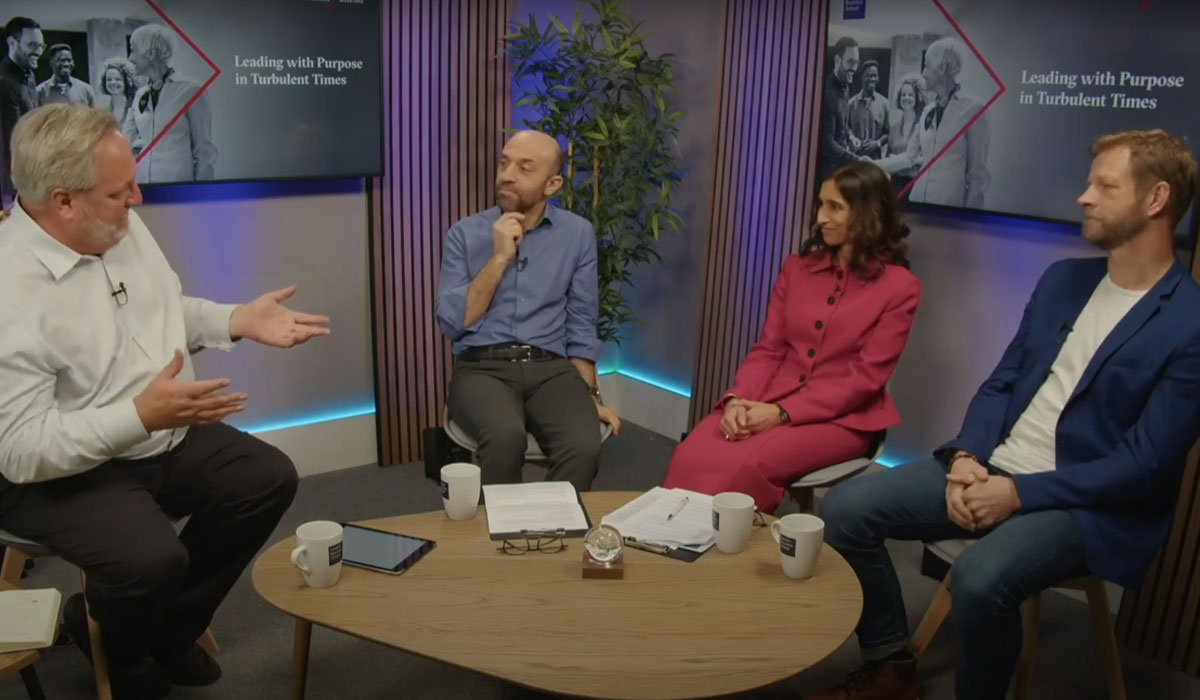Leadership spotlight: Leading for good when times are bad
The panel from our first 2024 think ahead event says to drive your business forward in turbulent times, prioritise these five behaviours.

The recent past has been littered with unprecedented events and great shifts in geopolitics, economics, technology and social dynamics. Business leaders know too well they are operating in complex, volatile and confusing times where they are likely to face a shock at best or crisis at worst, whether that is existential, like the pandemic, or evolving from an internal issue.
Then, there is the continued difficult economic conditions which mean redundancies and workforce restructuring is becoming almost normalised. The continued state of disruption can be draining for all concerned, not least those tasked with finding a way through.
How to navigate these stressful, uncertain times and emerge with your organisations stronger, better prepared for the future and with employees who are still engaged and motivated rather than switched off and even traumatised?
"Risk taking is necessary for innovation and in a crisis we need to come up with new solutions."

This was the thorny topic that was thrashed out at our first LBS think ahead event in 2024, hosted by Randall Peterson, Professor of Organisational Behaviour; Academic Director of the Leadership Institute at London Business School. He was joined by David Faro, Associate Professor of Marketing, London Business School, who teaches Crisis Leadership and Human Behaviour on the School’s MBA and Executive MBA programmes, Priya Mande JEMBA2002, CEO of a soon-to-launch stealth biotech and former deputy director of the UK’s COVID-19 Vaccine Taskforce and Chris Averill, who founded and sold a company and is now a business coach and leadership advisor. He wrote and published the book Build Sell Retire in 2021.
The conversation surfaced the following as the behaviours great leaders will prioritise:
Use crisis as a catalyst for change
Randall Peterson says that times of volatility and stress cause threat-rigidity, meaning that fear and anxiety caused by the situation encourage people to revert to a narrower view of the world; to hunker down and follow a familiar path. At times like these, we lean more towards outcomes and results, and everyone is terrified of making mistakes, which is ironically the exact opposite of the approach needed. Risk taking is necessary for innovation and in a crisis we need to come up with new solutions. Priya highlights how as CEO of an immuno-oncology biotech company during the COVID-19 crisis, she steered the pivot of global clinical trials designed for cancer therapies to infectious diseases.
"Leaders should embrace a crisis as a time to pause; as an interruption of business as usual to reflect on the direction of travel of the organisation and take stock."
The company had to take swift decisions on working arrangements and securing reagents for diagnostic testing. She reflects on how crises and turbulent times are perceived as negative events, but they’re actually about change. Build resilience into the foundations of your organisations so that in times of crisis, you have the right risk guardrails in place, but can use the chaos to allow entrepreneurialism to flourish through all levels of your workforce, push boundaries and experiment.
The upside of a crisis is that people are more open to different ideas, especially if they believe it could be positive in the long-term. David says leaders should embrace a crisis as a time to pause; as an interruption of business as usual to reflect on the direction of travel of the organisation and take stock, just as the Covid-19 pandemic provided that inflection point for millions of individuals around the world.
Overcome HiPPO syndrome
If you are the CEO or have VP or director in your title, you may be perceived as a HiPPO, which translates verbatim as Highest Income Paid Person’s Opinion. This means there is disproportionate attention on what you say and you are unlikely to be challenged. Your comments and opinions could hold more sway than they should or you’d expect, which makes your organisation vulnerable. In better times, this way of operating is not optimal for the sustainable health of your organisation and in a crisis it is impossible.
The panellists speak about “bottom-up leadership” where responsibilities are pushed down the organisation and more junior employees, often at the coalface of the problems, are encouraged with feeding that knowledge back up the hierarchy and even being allowed the flexibility and agility to come up with solutions. Chris reflects on the young age of the astronauts in NASA’s historic Apollo 11 moon landing. He says junior employees do not shoulder the pressures that senior executives will be feeling and have less to lose. You should listen to them.

Use purpose and values to create reassurance and stability
In a time of crisis, there can be an expectation that leaders have all the answers. During the pandemic, Randall says his experiences of talking to senior executives was that their employees were looking to them for information and reassurance, and they just didn’t have it. So, what to tell them? Having a clear sense of organisational purpose and values at this time will separate success and failure because you can use these to reassure people that while circumstances have changed, the purpose, vision and values of the organisation remain the same. Randall speaks about a particular bank in Egypt, which during the revolution, did not shut their doors like their rivals. Instead, they doubled down on making sure they had the liquidity to serve their customers – and when the political climate settled, they ended up with significantly more deposits than when they started.
"Effective communication will help to take your workforce with you through the crisis."
“They sent a strong signal about continuity and trust,” says Randall, as well as the type of behaviour their customers can expect in future crises. “Sometimes you can’t guarantee particular outcomes, but you can still talk about values, mission and purpose and those are the things required to reduce the panic and make people feel that their organisation is still one they recognise.”
Communicate often; communicate effectively
Communication is essential during a crisis as is authenticity of leadership. Be honest, be transparent and keep the narrative simple, easy to digest and in line with your vision and values, say the panellists. During the tense coronavirus briefings, people are most likely to recall the colourful football analogies used by Jonathan Van-Tam, England’s then deputy chief medical officer to describe various significant events, like the development of the Pfizer vaccine – “You haven’t won the cup yet, but what it does, it tells you that the goalkeeper can be beaten”. Effective communication will help to take your workforce with you through the crisis, helping them to appreciate the situation and the actions that must be taken and fostering their loyalty and engagement for the future.
Be human and prioritise wellbeing – your own first!
David says that while we think of crisis as a novel situation; how humans respond to crisis is actually more predictable. The fear, the freezing, the reluctance to take risks, we know these are likely to happen no matter what the crisis looks like. Good leaders will be interested in human behaviour and will anticipate how their employees will react so that they can get ahead of the curve by identifying strategies to give reassurance and psychological safety to their workers. Good leaders will be a buffer, absorbing the shock and worst reactions, so as to mitigate the long-term impact to their business.
Self-awareness in leaders is also key. Showing panic will not be helpful. Don’t become the worst version of yourself. “Take care of yourself, so you can take care of others,” says Randall. “If your workforce is panicked, they will shut down and not innovate.” There will be times people will feel drained, when people need motivation and support and there will be times when leaders should apologise because they were a bit snappy on a Zoom call. Priya says listen to understand rather than to respond and recognise that no one is perfect.
Humour can be a powerful tonic, too, even in the most serious times, but compassion and empathy are key. In a restructuring, Randall says the single biggest predictor of what happens to the workforce is how you treat the people who are leaving. He says: “Over and over leaders forget this and that dramatically reduces commitment to the organisation. So, whatever you do, have a heart."




